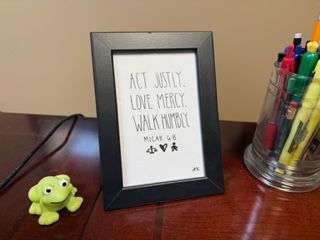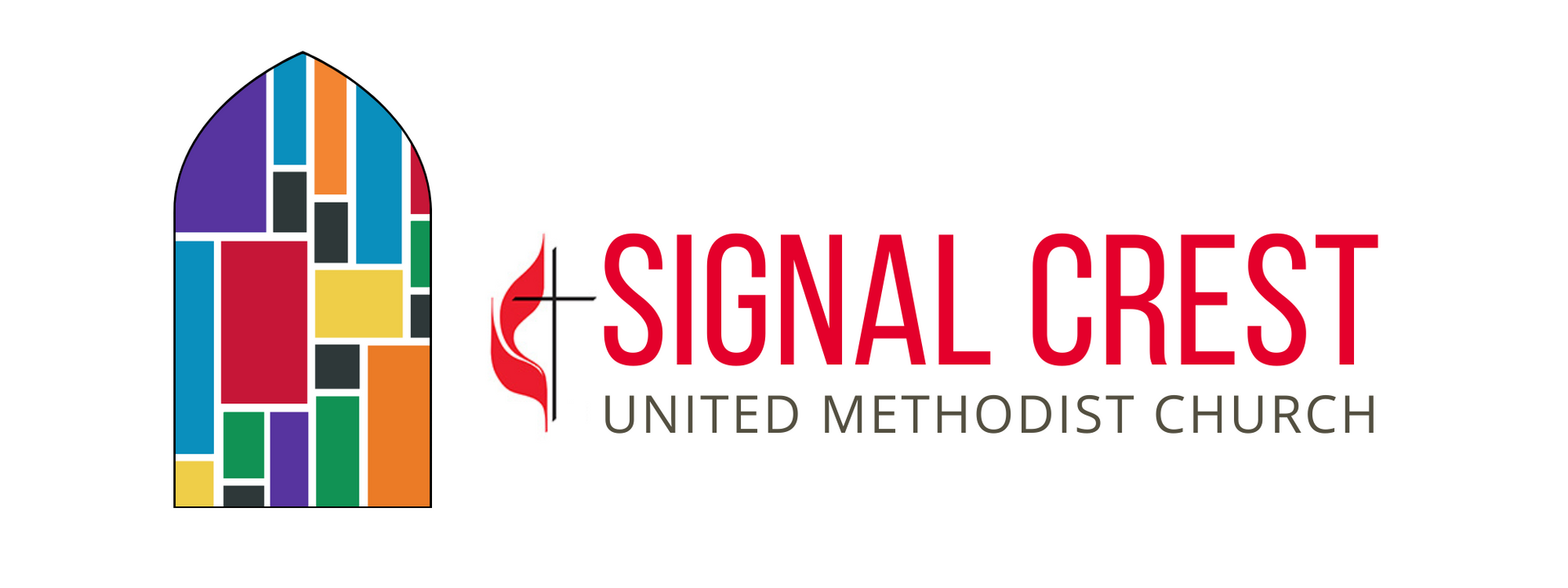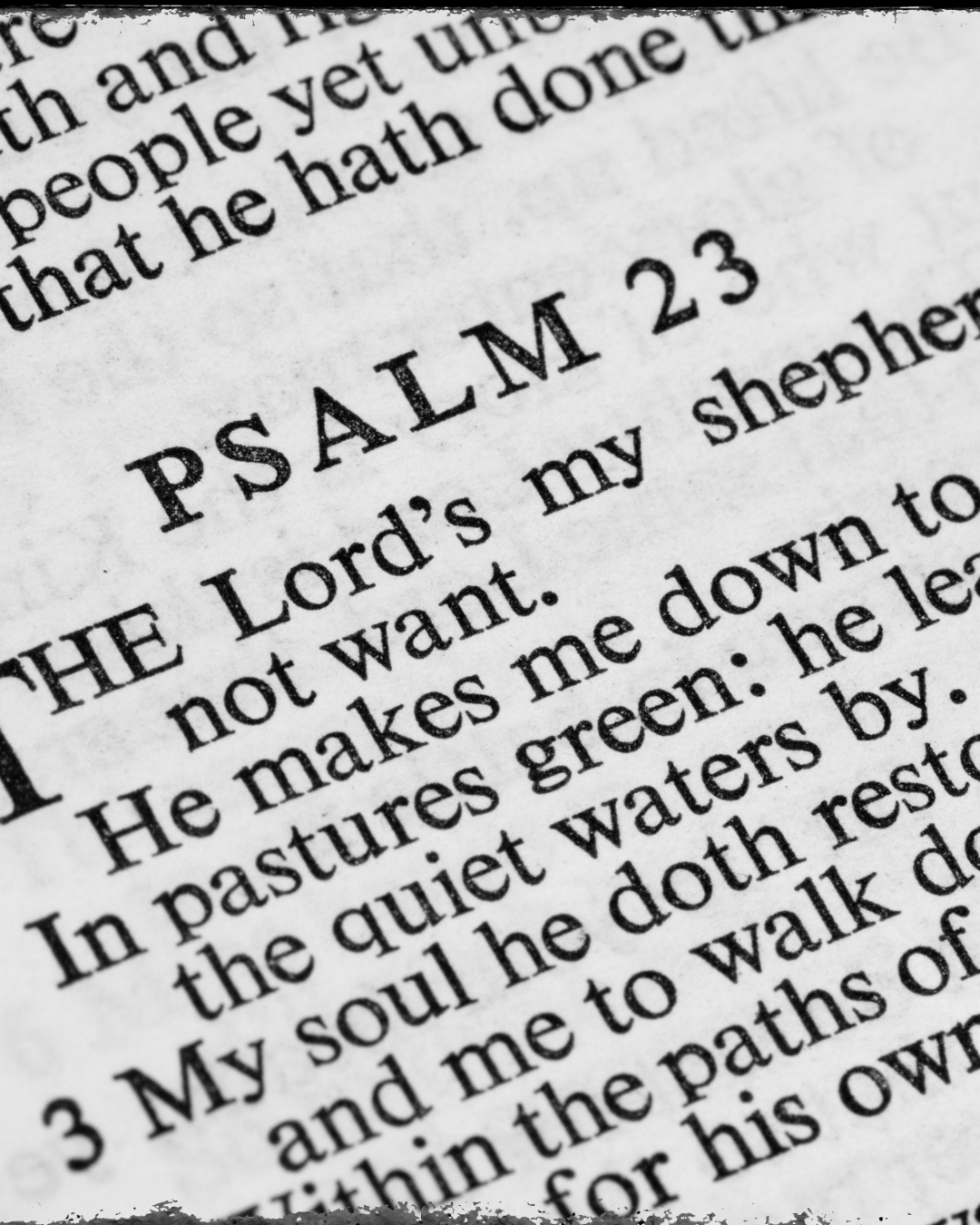
When I ask folks what they love most about this church, one of the most frequent responses is “the music.” And they’re right! The music at this church—in both our 9AM Crest service and our 11AM sanctuary service—is both inspired and inspiring! Consistently so. And it seemed especially so this past Sunday. In the sanctuary service, Andrew sang a song that I don’t believe I had ever heard before—“Four Days More.” He had told me he had picked out the perfect song for the scripture, and no lie! It went right along with the story in John 11 of Lazarus’ death and Martha’s frustration that it took Jesus so long for him to get there. But “isn’t it great,” the song inquires, “when He’s four days late, He’s still on time.” What reason even is there for anyone to preach after we’ve heard a song like that? (By the way, that was a rhetorical question!) And in the Crest service, Margee sang a song that I’m not sure I remember hearing either. It is called “Still Waters (Psalm 23).” The lyrics grabbed me from the very first line: “Great Aunt Maurine said at a hundred and three / Write scripture on your heart for when you need it / ‘Cause anxiety hates Psalm 23 / So just say it to yourself ‘til you believe it.” As soon as I heard Margee sing that line “Write scripture on your heart for when you need it,” I was reminded of an old Hasidic Jewish story that goes something like this: A disciple asked their teacher, “Why does the scripture tell us to ‘place these words upon your hearts’? Why not tell us to place them in our hearts?’ The teacher responded, “It is because, as we are, our hearts are closed, and we cannot place the holy words in our hearts. So we place them on top of our hearts. And that’s where they stay until, one day, when our heart breaks, the holy words can fall in.” As far as I’m concerned, the words of Psalm 23 are as good as any for us to place on our hearts. As the writers of “Still Waters” paraphrased it, The Lord is my shepherd, I shall not want He leads me by still waters ‘til my fears are gone Though I walk through the valley of the shadow of death Oh, I know You are with me, my Father, my friend Your goodness and mercy will follow me all of my days I know by Your still waters, I’m safe
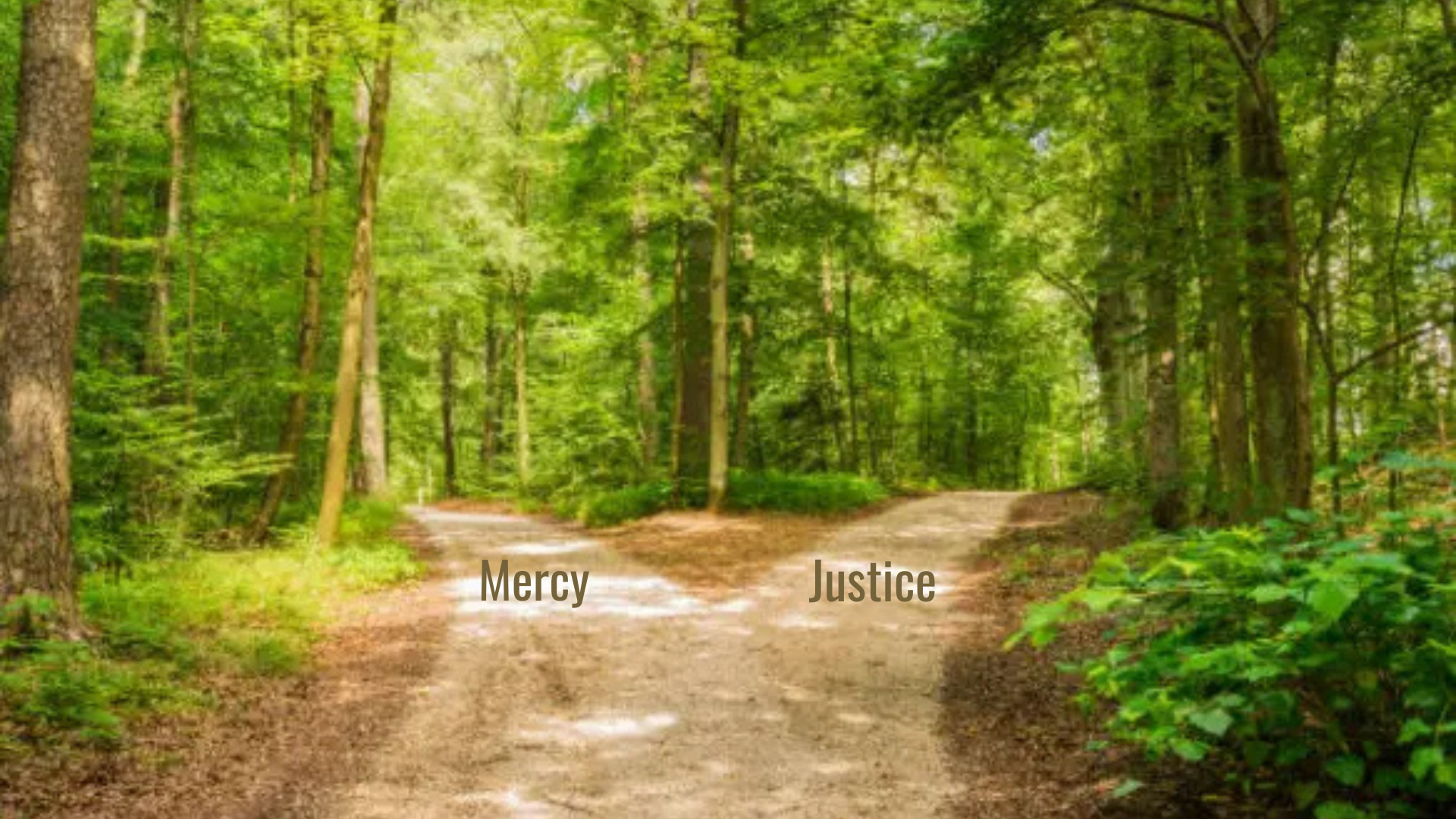
Over the weekend I finished another book that’s been making the rounds lately, Allen Levi’s Theo of Golden. Mr. Levi lives in a small town in Georgia, and he was here on Signal Mountain a couple of years ago as the guest author at the local library not long before the book really hit it big. I saw it was Katie Couric’s book club pick this month. It seems like just about every person I talk to these days has read it or wants to! In the book, a mysterious and strangely foreign older man called Theo moves to a small southern city called Golden, where he gets to know some of the townspeople at the local coffee shop, bookstore, and park. It’s an endearing story about kindness, generosity, and close attentiveness to the people we find ourselves with at any given moment. Several of my clergy colleagues who’ve read it have commented on how it’s full of sermon illustrations, so you might have to hear about this book again. One of the characters we meet is a minor character named Grandmother Whitaker. She is the mother of one of the more prominent characters, Kendrick, who is the night custodian at the local college, and the grandmother of Kendrick’s young daughter Lamisha, who was badly injured in a car accident. Before the sentencing of the man who was driving the car that injured Lamisha and killed her mother, Kendrick is pondering what kind of victim’s statement to offer. He asks his mother what he should do. Here’s what Grandmother Whitaker tells him: “Baby, they’s justice and they’s mercy. If you not sure what to do and you gotta choose one or the other, I say always go the mercy way. If you make a mistake, make it for mercy. Bad mercy don’t hurt nearly like bad justice, and always remember, the eye of God can see.” I don’t about you, but that sounds like gospel to me. And since this is reported to have been shared in a town called Golden, maybe we could consider it another “Golden Rule.”

A couple of weeks ago, one of our church’s preschool teachers let me borrow a book I’ve been hearing a lot about lately, The Correspondent by Virginia Evans. It’s an epistolary novel, meaning it’s a bunch of letters written over the years that tell the story of a fictional woman named Sybil who spends her life exchanging letters—with her brother, with her daughter, with her best friend, with her neighbor, with a customer service representative at a genetic testing company, even with real-life authors like Joan Didion and Ann Padgett. It’s completely engrossing to come to know this captivating, complicated woman through her vast correspondence with so many others in her life. In this world of social media and text messages, it can seem like sitting down and composing a letter to someone else is becoming a lost art. But for Sybil, it was a discipline that she set aside time for around 10 o’clock in the morning on Tuesdays and Thursdays (and occasionally Saturdays as well). I can’t tell you the last time I sat down to write a letter to someone. Oh sure, I’ve penned a few thank-you cards and short notes here and there. But not the kind of longer, more reflective, expressive kinds of letters like she shared. But the book did get me thinking about some of the letters that I’ve seen or exchanged myself over the years. My dad grew up one of six children, and for years, long before there was such a thing as email (this was in the 1950s, 60s, and 70s), his parents and siblings exchanged a circular letter they called the “Round Robin,” where one of the members of the family would start a letter, send it to the next member, who would then add their own news, and then send the composite letter on to the next member, who would add their own news, and send that on down the line, and so forth. Several of the entries in my grandfather’s daily diaries from those years included notes like “The Robin came round today.” A few years ago, cleaning out my childhood home, I found a box containing some of the letters my dad wrote to my mom when he was in the Army, from both before and after they got married. Who knew that they were real people before I was born? I have also kept in a box several of the lengthy emails that Tracy and I exchanged when we were dating, before I moved to Atlanta to start seminary. I often think about getting those out and rereading them. Would I still recognize the authors? Do you have any special letters that you have kept, that you cherish? Who are they from? What is it about them that makes them so special to you? If you could receive a letter from anyone in the world, living or dead, who would it be? And what would you hope they would share with you? If you could write anyone a letter today, who would it be? What would you want to share with them?

My wife Tracy and I recently finished watching the first season of the award-winning medical drama “The Pitt,” which is set in an Emergency Department in a Pittsburgh hospital. It stars Noah Wyle, who played an emergency physician in the hit show from long ago “E.R.” It’s a fast-paced, intense show. It’s hard to keep up with all the medicalese. But one thing that I noticed is how the health care providers always have a stethoscope draped around their neck. Amidst all the sophisticated medical equipment like ECMO machines, so often it is this simple tool that they turn to first to diagnose the patients’ conditions and start getting them the help they need. A stethoscope is a listening device. It is a tool that is used for listening to the heart, the lungs, and the gut for any abnormalities that might indicate what the patient’s problem might be. It strikes me that the first thing a health care provider does is to listen. Before they pronounce a diagnosis or prescribe a cure, they listen. That’s a good reminder for a preacher like me who talks a lot for a living, and maybe it’s a good reminder for all of us. Before God wants us to speak a word for God, maybe what God wants most from us is to listen to God—to listen to God’s heartbeat, to listen for where God’s Spirit is moving, to listen for who and what God is compassionate about in God’s gut (the New Testament word for compassion comes from the word for bowels). Our first job as disciples is to listen to God. Thankfully, we have several tools at hand for us to use to listen to God. We have scripture. We have prayer. We have worship. And we have one another in the community of faith. These are our spiritual stethoscopes! I want us to spend some deliberate time together this year listening to God and where God would like to lead us as a congregation in deepening our discipleship and expanding our witness. Our staff will be gathering next month for a visioning session to gather some of the hopes and dreams God is placing in our hearts. We also have formed a Vision Team here at the church in which a group of members from across our congregation will be discerning together what God might like to do among us and through us. If you have a dream or a vision for what might happen here at Signal Crest that glorifies God and grows disciples, I hope you will let me know. I would love to listen! Our broader church is in a listening process as well as we seek God’s guidance into our life together. Bishop Debra Wallace-Padgett is inviting church members across our denomination to participate in a survey in which you can share what is best about the UMC and what your hopes are for our future ministries together. I’ve completed the survey myself. It will take you about 5-10 minutes, and it will be available until February 15. You can access it at this link or at the QR code below. Our collective input will be shared across the denomination in the months leading up to an October leadership gathering and will inform the future priorities of our denomination’s ministry together. So let’s all put our spiritual stethoscopes on and listen together for the leadership of God’s Spirit!

Earlier this week we observed Martin Luther King Jr. Day. In his sermon this past Sunday, Pastor Drew referred to King’s famous “I Have a Dream” speech, where King envisioned a day when his children would “not be judged by the color of their skin but by the content of their character.” King also talked about “the Beloved Community,” where all God’s people, of all creeds and colors and conditions, can join hands and work together, can sing and stand and struggle for freedom and justice together. While I certainly want to believe we have made some strides since King’s day toward making that dream come true, it cannot be denied that it remains a dream that has yet to be fully realized in our own communities. There is still more work to be done together, more life and love to be shared together, more freedom and justice to be sought together. One of the things I try to think and pray about every year on and around MLK Day is what can I do, me, personally, to help make Dr. King’s dream of the Beloved Community come true in our world today. And it’s not just Dr. King’s dream; it is essentially what Jesus described as “the kingdom of God” and others after him have called “the kin-dom of God,” the family of God, the kinship in Christ. It’s the world that the Apostle Paul described where “there is no longer Jew or Greek, there is no longer slave or free; there is no longer male and female; for all of you are one in Christ Jesus” (Galatians 3:28). That’s what we’re all aiming for, isn’t it? So what can I do to help us get there? What can you do? How can you and I use what influence we have, and what gifts we have been given, what networks we inhabit, to fulfill this vision, this dream today? Pastor Drew described one opportunity for us to consider this past Sunday—his dream of our church’s expansion of our youth ministry in partnership with our friends and neighbors in the southside of Chattanooga. We can help host and serve the weekly meal we help provide student-athletes at the Howard School on Wednesday evenings. He’s in need of more volunteers to be a part of this ministry; let him know if you can help. Another thing we can do, in this skeptical, cynical old world, is to believe—to believe in this dream. And this is no small thing. Several years ago, a newspaper columnist in Knoxville, Ina Hughs, compiled some of King’s words into a kind of creed, a belief statement. I cut that column out of the paper and have kept it to this day. Here are some of King’s words that she shared: “I refuse to believe that we are unable to influence the events which surround us.” “I refuse to believe that we are so bound to racism and war, that peace, brotherhood and sisterhood are not possible.” “I believe there is an urgent need for people to overcome oppression and violence, without resorting to violence and oppression.” “I believe that we need to discover a way to live together in peace, a way which rejects revenge, aggression, and retaliation. The foundation of this way is love.” “I believe that unarmed truth and unconditional love will have the final word in reality.” “I believe that right temporarily defeated is stronger than evil triumphant.” “I believe that what self-centered people have torn down, other-centered people can build up.” “By the goodness of God at work within people, I believe that brokenness can be healed, ‘And the lion and the lamb shall lie down together, and everyone will sit under their own vine and fig tree, and none shall be afraid.’”

Have you ever had, or needed, a fresh start? A reset? Have you ever wished you had a “Control-Alt-Delete” button you could push to give you a restart (if you don’t get that reference, then ask one of your elders to explain it to you!) I was listening to a report on the radio last week that talked about how professional baseball players who are traded to a different team in the middle of the season get a fresh start, a reset, that often results in a bump in their performance after the trade. Their batting average, for example, might jump from the 200s to the 300s. Researchers found that this bump was even more pronounced when the player was traded from one league to another. Why might this be the case? There are two different leagues in professional baseball, the National League and the American League. When a player is traded to a team within the same, that players’ statistics carry forward. But when a trade takes place from one league to the other, the players’ statistics automatically reset. It’s like they’re starting again from scratch. So a cross-league trade offers the player a completely fresh start, and that reset often results in improved performance. I found this report fascinating, and it made me wonder: Have you ever experienced something like this, a fresh start, a reset? Maybe it’s a new school, or a new job, or retirement, or a recovery from an illness or injury, or a new season in your life. I think every time I’ve moved to a new appointment, it’s been something of a fresh start, a reset for me in my ministry. I also remember when we moved here to Signal Mountain and Wesley was going into his junior year in high school. I worried about how moving in the middle of high school would affect him, but he was actually looking forward to a fresh start. It would be an opportunity, he said, for a reset. Maybe one of the reasons we celebrate a new year is that it provides an opportunity for a fresh start, a reset. It’s a time to wipe the slate clean, return all the ledgers to zero, let the past be the past, and look ahead with new energy and enthusiasm. And unlike baseball players who are traded from one team to another, it doesn’t necessarily require a physical move from one place to another. It’s more of a spiritual mentality. Every single day, every new morning, in its own way, offers a fresh start, a reset. And maybe that’s why I love the prayer of thanksgiving for the order of worship for morning prayer that we find in the back of our hymnal (#877): New every morning is your love, great God of light, and all day long you are working for good in the world. Stir up in us desire to serve you, to live peacefully with our neighbors, and to devote each day to your Son, our Savior, Jesus Christ the Lord. Amen.

What are you doing New Year’s Eve? Perhaps this question reminds you of an old Ella Fitzgerald classic! Or perhaps you are familiar with the tradition of churches hosting a Watch Night service on New Year’s Eve. The Watch Night tradition traces back to Moravian churches in Europe in the 18th century who would host on this night a vigil to reflect on the year just past and to prepare, through repentance and resolution, for the year to come. John Wesley, the founder of the Methodist movement in England, attended a Moravian Watch Night service and later adapted it for a Covenant Renewal service that is still frequently celebrated at the turn of the new year. The Watch Night tradition took on additional significance for African Americans during the Civil War as enslaved persons gathered in homes and churches on December 31, 1862. This was the night before President Abraham Lincoln’s Emancipation Proclamation took effect. They stayed up well past midnight to watch the long dark night of slavery turn into a bright new dawn of freedom. Watch Night services continue to be a strong tradition in many African American churches today. The Watch Night tradition invites us all to reflect back on the year just past with gratitude for God’s presence with us through the ups and downs, the good and the bad, as well as to look toward the year ahead with confidence in God’s promise to continue to guide us along our way toward the freedom and fullness of life together in Christ. So as we prepare to enter the new year 2026, I’d like to invite us to join in “A Covenant Prayer in the Wesleyan Tradition” (United Methodist Hymnal, #607) as a prayer for each of us personally, for our families, and for our congregation at Signal Crest: I am no longer my own, but thine. Put me to what thou wilt, rank me with whom thou wilt. Put me to doing, put me to suffering. Let me be employed by thee or laid aside for thee, Exalted for thee or brought low for thee. Let me be full, let me be empty. Let me have all things, let me have nothing. I freely and heartily yield all things to thy pleasure and disposal. And now, O glorious and blessed God, Father, Son, and Holy Spirit, Thou art mine, and I am thine. So be it. And the covenant I have made on earth, Let it be ratified in heaven. Amen.
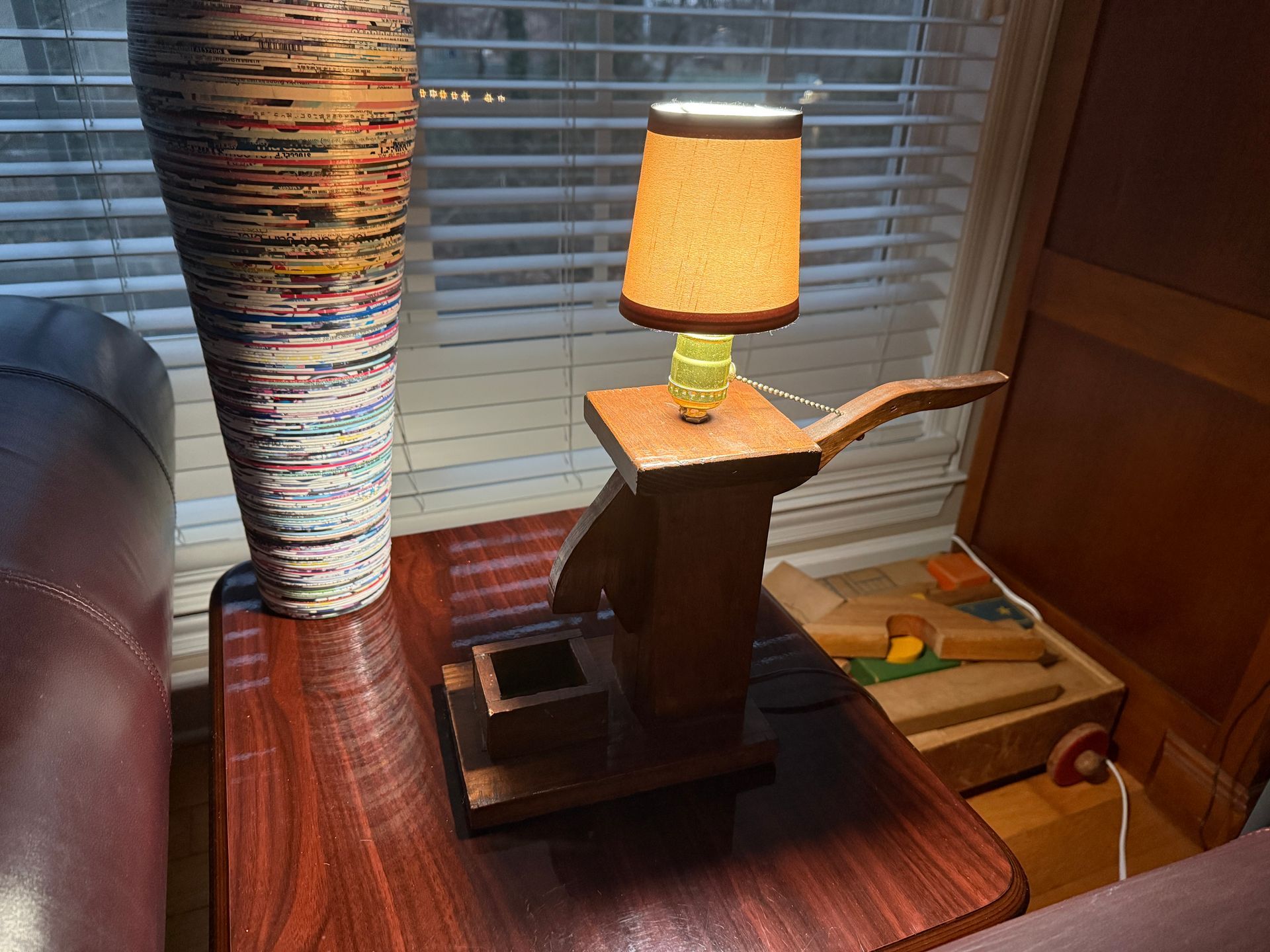
What’s the best Christmas gift you’ve ever received? Aside from Jesus, of course ;-) The red big wheel spinout speedster might be up there for me. Another one might be the year I got my very own jambox. But I’d have to say that the very best gift I’ve received wasn’t exactly a gift, in the way we normally think of gifts, but it did come around Christmas. When I was in the fall of 7 th grade, I took a shop class, where we learned about all kinds of tools for woodworking, electronics, and other practical applications. The final project was to build a lamp that looked like an old water pump. Everyone who had ever taken shop class had a lamp like that. My brother had one. Now it was my turn to make a lamp. The instructions for this lamp were about as old as the book of Job, and I tried to follow them to the letter. Measuring the wood, measuring it again just to be sure, cutting the wood, sanding the wood, sanding the wood some more, gluing the wood, staining the wood, etc. When I got the cord attached to the socket and the socket in its place, I found that the socket wouldn’t sit square in its seat. It wobbled, and I had no idea why. I thought I had followed the instructions to the letter. That Christmas break, everyone else was taking home a perfect little wooden lamp, except for me. I had the Charlie Brown Christmas tree of wooden lamps. I was capital-F Forlorn. I was embarrassed to show it to my parents, and especially to my brother (whose lamp was also perfect). But I remember my dad looking at it, thinking to himself for a moment, and then telling me he knew someone we could call about this. He called his friend Jack Eggleston, who was the plant manager for the local manufacturer in town. I really didn’t want the guy whose plant built fancy pool tables to see my puny little lamp. But a few days before Christmas, we loaded up the lamp and took it over to Mr. Eggleston’s house. He took the lamp in his hands, turned it around, told me I did a nice job on the sanding and staining, and then he said he had an idea on what we could do. He got out his own toolbox, dug around and found a little nut. Then he slipped that little nut into place right below the socket, and voila—no more wobble! Just like that, it was fixed, and it worked perfectly. That was nearly forty years ago now. Both my dad and Mr. Eggleston have long since died. But the lamp lives on! It stands on a side table in our den and still shines the light. And of all the Christmas gifts I’ve received over the years, I believe it was Mr. Eggleston’s small act of kindness toward this awkward kid that shines the brightest.

The pop song may proclaim “it’s the most wonderful time of the year,” but for many folks, December is a difficult month. With the days getting shorter and the nights coming on earlier, many people experience the down-turned spirits of Seasonal Affective Disorder. And for those who have lost a loved one, the holidays can be especially difficult. My dad died in December over thirty years ago, and today is the twentieth anniversary of Tracy’s dad’s death. December can be a hard month for a lot of people. Ever since this season became tenderized by the experience of grief and loss, I have found myself drawn to another song. It’s not one of the most popular or beloved of the Christmas songs, but it can be found in our hymnal (#221). The words were written by a 19 th century English poet, Christina Rosetti, who suffered poor health from a young age. Her words were set to a soft, gentle tune from the composer Gustav Holst. It’s the hymn “In the Bleak Midwinter.” In the bleak midwinter, frosty wind made moan, Earth stood hard as iron, water like a stone; Snow had fallen, snow on snow, snow on snow, In the bleak midwinter, long ago. She draws from an old tradition that it snowed on the evening of Christ’s birth, blanketing the fallen world with pure white. And even though I later learned that scholars believe Jesus may have actually been born during the summertime (when traveling to your hometown to register for a census would have made more sense), I still prefer thinking he was born “in the bleak midwinter.” The early church apparently preferred this timing, too, and so they set the celebration of Christmas to coincide with the winter solstice, the so-called “longest night,” which is the point when the land’s deepening darkness reverses, the light returns, and the days begin to lengthen again. I still draw comfort and hope in thinking that it was “in the bleak midwinter,” around the time of the longest night of the year, that Jesus, the Light of the World, was born into this world. However bleak our lives may feel, or the news of our world may seem, that’s precisely when Jesus first came, and when Jesus still comes, even today.

